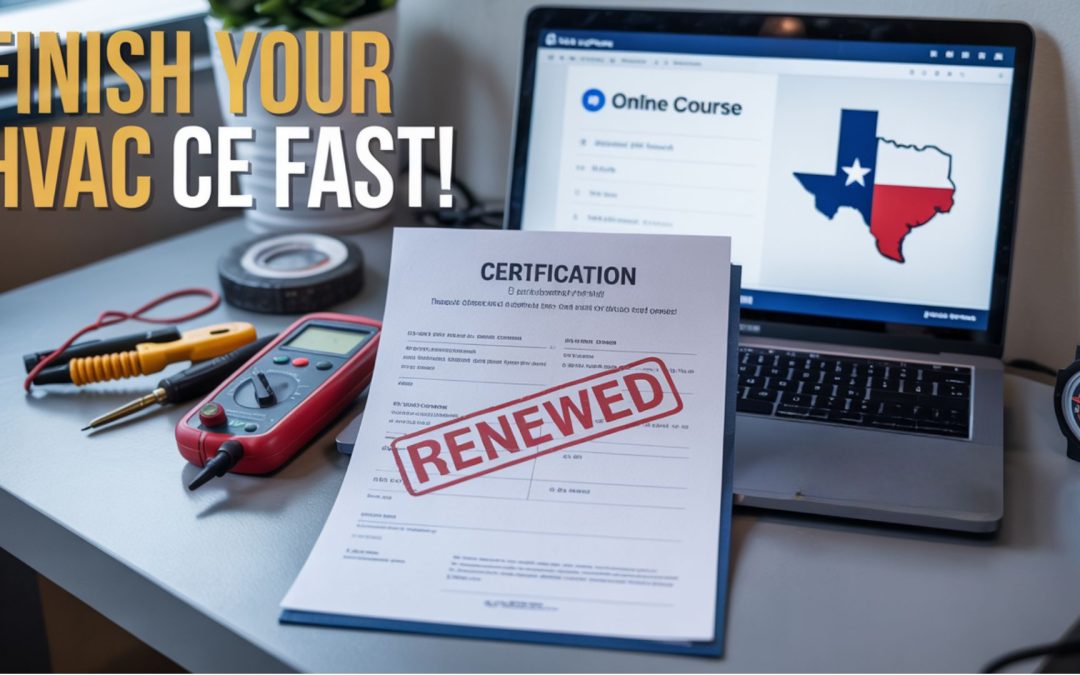Need to complete your HVAC continuing education for your Texas license renewal? This blog offers effective strategies to complete your Texas HVAC continuing education for license renewal and helps you navigate the process. Learn how to choose approved courses, manage your time, and meet all state requirements seamlessly.
Key Takeaways
- Texas HVAC professionals must complete eight hours of continuing education annually, including one hour focusing on state laws and regulations, to maintain their licenses.
- Selecting accredited and relevant courses that align with personal and professional goals enhances compliance and career advancement opportunities in the HVAC industry.
- Utilizing online learning platforms offers flexibility, affordability, and interactive tools, enabling HVAC professionals to effectively balance continuing education with their professional responsibilities.
Understand Texas HVAC Continuing Education Requirements
Understanding the specifics of Texas HVAC continuing education requirements is the first step to ensuring your license renewal process goes smoothly. Texas mandates that HVAC professionals complete eight required hours of continuing education annually to renew their licenses. This includes at least one hour specifically focused on Texas laws and regulations, a critical component to ensure that all HVAC work complies with state standards. Understanding the common mistakes during HVAC license renewal, such as missing deadlines, taking non-approved courses, or failing to keep documentation, can help you stay compliant and avoid delays.
Only courses approved by the Texas Department of Licensing and Regulation are eligible to count towards these eight hours of continuing education. It’s essential to choose these courses carefully, as HVAC professionals are responsible for maintaining copies of their course completion certificates for at least one year. This documentation is vital for the renewal process and can be requested by the state at any time.
Choose the Right Continuing Education Courses
Selecting the right continuing education courses is crucial for meeting state requirements and advancing your career. When choosing a course, consider factors such as the value of the content, alignment with your personal and professional goals, and compliance with Texas regulations. The right course will not only help you stay compliant but also enhance your expertise and competitiveness in the HVAC industry.
Evaluating the relevance and quality of the relevant courses is also crucial. Ensure the complete courses provide comprehensive content that aligns with current industry standards and supports essential skills improvement and career growth, as these are key factors in achieving success.
Affordability is another factor to consider, but it should not come at the expense of quality. Investing in high-quality continuing education enhances the service you provide, supports career advancement, and keeps you updated with the latest industry standards.
State-Specific Course Content
Understanding and complying with local laws and evolving regulations is essential for HVAC professionals and HVAC contractors. When choosing a course, evaluate providers based on their ability to meet state requirements and the quality of the learning experience, ensuring that they meet just regulatory requirements and regulatory compliance.
Transparency about the curriculum, support, and overall effectiveness is crucial to ensure that the courses are both relevant and beneficial.
Accredited Providers
When selecting HVAC courses, consider the following:
- Choose state-approved providers to ensure the courses fulfill legal education requirements.
- Look for strong reviews and testimonials from other HVAC professionals to gain insight into the effectiveness of the courses.
- Ensure the courses align with your professional goals.
Reliable providers should also offer robust support through live chat, email, or detailed FAQs to assist you throughout your learning journey.
Course Relevance
Courses that incorporate the latest HVAC technologies and practices ensure that you stay relevant in the evolving industry landscape. Hands-on experience gained through these courses is essential for developing competencies in advanced diagnostics and energy efficiency in HVAC systems and HVAC codes.
Embracing a lifelong learning approach and ongoing learning while enhancing skills helps you stay competitive and continuously aware of technological advancements, giving you a competitive edge.
Leverage Online Learning Platforms
Online learning has revolutionized the approach to continuing education for HVAC professionals. Key benefits and features include:
- Flexibility and accessibility that allow balancing education with work schedules effectively.
- More affordability compared to traditional training methods.
- Elimination of commuting or lodging expenses.
- A user-friendly interface.
- Mobile compatibility.
- Easy access to course materials.
Interactive learning tools, such as video tutorials, quizzes, and interactive modules, enhance engagement and improve knowledge retention. This combination of flexibility, affordability, and interactivity makes online learning an excellent choice for busy HVAC professionals striving to stay ahead in their field.
Flexibility in Scheduling
Self-paced online courses allow you to revisit material as needed, accommodating individual learning speeds and preferences. Building a personalized study schedule helps you align study times with your peak energy levels, ensuring maximum productivity and effective learning.
This flexibility is particularly beneficial for HVAC professionals with demanding work lives.
Accessibility from Anywhere
Online learning platforms offer internet courses that enable you to study from any location with internet access, making it easier to balance work with educational requirements.
Mobile-friendly platforms further enhance accessibility, allowing you to complete lessons on smartphones or tablets, whether you’re at home, on a job site, or traveling.
Interactive Learning Tools
Interactive learning tools such as:
- video tutorials
- quizzes
- Interactive modules make online HVAC continuing education courses more engaging and effective.
These tools promote active participation, improving knowledge retention and making the learning experience more enjoyable.
Time Management Strategies
Effective time management is crucial for completing continuing education without disrupting your professional responsibilities. Self-paced courses offer tailored learning schedules and the flexibility to complete coursework at your own pace. Creating a clear calendar that includes deadlines and commitments helps track responsibilities and ensures consistent progress.
Balancing ongoing education with other life responsibilities is essential for success. Identifying urgent tasks and completing simpler assignments first can alleviate pressure while managing coursework. Staying informed about renewal deadlines prevents a rush and ensures compliance with state regulations.
Setting a Study Schedule
A well-structured study schedule can help you maintain focus and ensure consistent progress towards completing courses. Establishing specific blocks of time for studying builds a reliable routine, enhancing consistency and focus.
Prioritizing Coursework
Focusing on coursework during less-demanding times helps maintain consistent progress and lessens the pressure during busier periods. This approach facilitates uninterrupted learning and better retention of material.
Utilizing Downtime
Utilizing downtime, such as travel or waiting periods, enhances your learning opportunities. Online training enables HVAC technicians to study during downtime between service appointments, maximizing available learning time.
Incorporating review sessions during travel or waiting periods can enhance the retention of course materials and ensure continuous progress.
Maximizing the Value of Continuing Education
Selecting appropriate courses significantly influences professional development and compliance for HVAC professionals. Companies investing in online training for their HVAC professionals can experience significant profit increases, averaging over 24% higher margins. Participating in continuing education enhances professional competence and is vital for career growth in the HVAC field.
Effective time management reduces stress and increases productivity, allowing you to fulfill educational requirements alongside professional responsibilities. Using downtime effectively can help review course materials and complete assignments, maximizing education outcomes.
A growth mindset encourages professionals to view challenges as opportunities for professional growth.
Applying Knowledge to Practice
Applying knowledge and skills from HVAC courses to real-world scenarios enhances practical training and effectiveness in the field. Continuing education programs offer networking opportunities that can lead to sharing insights and experiences with peers and instructors, including theoretical knowledge.
Adopting a continuous learning mindset is essential for HVAC professionals to remain competitive and implement new technologies and practices effectively.
Networking Opportunities
Continuing education programs offer valuable networking opportunities for busy professionals with peers and industry instructors. Engaging with peers and instructors fosters valuable professional networks crucial for career development through a continuing education course, provided by a continuing education provider. Continued education is essential for staying competitive in today’s job market.
Building connections through HVAC education programs can lead to enhanced job prospects and collaborative opportunities in the hvac sector.
Continuous Learning Mindset
Adopting a continuous learning mindset is essential for HVAC professionals to remain competitive and adapt to industry changes. Implementing skills and knowledge gained from courses can significantly enhance job performance in real-world HVAC scenarios.
Preparing for License Renewal
Renewing your HVAC license in Texas involves several critical steps to ensure compliance with state regulations:
- Track your continuing education requirements carefully.
- Complete your continuing education before the HVAC license expires.
- Submit your renewal application on time.
- Note that late renewal may be possible if courses were completed within the previous year.
Staying ahead of deadlines mitigates last-minute stress and ensures compliance with state regulations. HVAC professionals can manage their continuing education effectively by:
- Creating a consistent study schedule to allocate specific times for completing courses.
- Prioritizing coursework during less busy periods to maintain steady progress.
- Avoiding cramming by spreading out study sessions before deadlines.
Tracking Completed Hours
Texas requires continuing education providers to report completed hours to the Texas Department of Licensing and Regulation within seven days after completion. To document your completed hours, ensure you receive a course completion certificate from your provider, which is essential for the renewal process.
Submitting Renewal Application
After completing the necessary education hours, you must log into the Texas Department of Licensing and Regulation’s License Renewal Portal to submit your application and pay the renewal fee.
Applications for license renewal must be submitted online along with the required non-refundable fees.
Staying Ahead of Deadlines
Staying ahead of deadlines for license renewal mitigates last-minute stress and ensures compliance with state regulations. Regularly tracking and documenting completed continuing education hours is crucial for ensuring readiness for license renewal.
Final Thoughts on Texas HVAC License Renewal
Completing your Texas HVAC continuing education for license renewal is more than just a state requirement; it’s an essential step to sharpen your skills, stay compliant, and remain competitive in the evolving HVAC industry. By understanding the requirements, selecting the right courses, leveraging online platforms, and managing your time efficiently, you can complete the process with ease and confidence.
State Approved Continuing Education offers a comprehensive selection of state-approved courses tailored to the requirements of HVAC continuing education in Texas. With our interactive, user-friendly online platform, you gain flexibility, affordability, and quality content to keep your credentials up to date.
Frequently Asked Questions
How many hours of continuing education are required for HVAC license renewal in Texas?
To renew your Texas HVAC license, you are required to complete eight hours of continuing education each year, which must include at least one hour dedicated to Texas laws and regulations.
How can I ensure that the courses I choose meet Texas state requirements?
To ensure that the courses you select meet Texas state requirements, choose only those approved by the Texas Department of Licensing and Regulation from state-approved providers. This will guarantee that the courses count towards the required continuing education hours.
What are the benefits of choosing online learning platforms for HVAC continuing education?
Choosing online learning platforms for HVAC continuing education provides essential flexibility and accessibility, enabling professionals to manage their studies alongside work commitments effectively. Moreover, the interactive tools available enhance engagement and promote better knowledge retention.
How can I effectively manage my time to complete the required continuing education hours?
To effectively manage your time and complete the required continuing education hours, create a structured calendar and study schedule, prioritizing coursework during less-demanding periods. Additionally, make use of any available downtime for studying and stay informed about renewal deadlines to prevent last-minute pressures.
What steps are involved in submitting the renewal application for my HVAC license in Texas?
To renew your HVAC license in Texas, log into the Texas Department of Licensing and Regulation’s License Renewal Portal to submit your application and pay the non-refundable renewal fee online after completing the necessary education hours.



